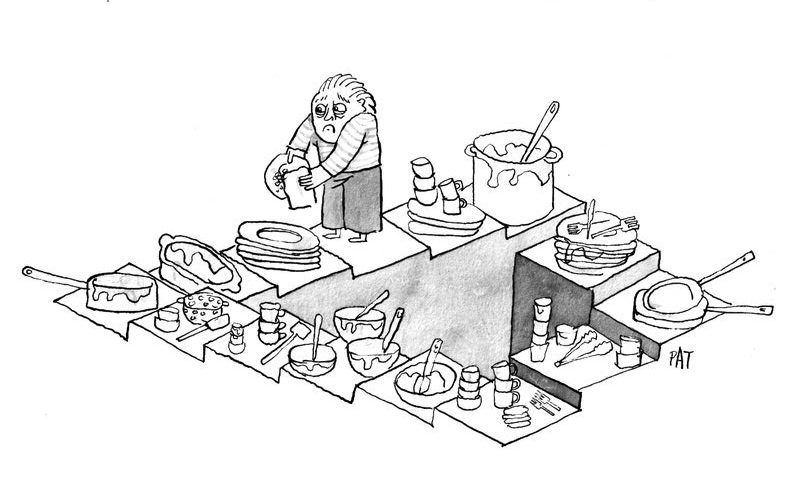Uneasy I had a dream the other night where I had taken a corner too fast on a sharp curve and went over the edge,…

Besides Chores, a Life of Love?
One of my favorite sermons was one I gave in St. Joseph, Michigan in 1971. I used the pulpit to preach what I truly thought was true and good: pot. I put a notice of the topic in the newspaper, and sure enough, some plain-clothes police showed up. I preached in favor of the legalization of pot, explaining it enhances moods and leads to creative thoughts.
Because it was still illegal, the joint I appeared to roll while in the pulpit was just imaginary. But I lit it up, inhaled, and passed it along. Various people either also took a toke or passed it along while abstaining. I don’t believe the police tried it.
Five decades later I was proud of the Unitarian Universalists of Grants Pass for allowing me to preach an even more advanced sermon on four psychoactive drugs. I’ll paste a link here to my own 2012 sermon.
These topics are on my mind again because I just finished reading Michael Pollan’s How to Change Your Mind: What the New Science of Psychedelics Teaches Us About Consciousness, Dying, Addiction, Depression, and Transcendence. I won’t try to do the book justice here except to recommend it. He’s an engaging writer who doesn’t bog readers down. He recounts the recent history of the promise of their use followed by harsh governmental repression followed again by a recent renaissance in research and relaxed laws. (A three-episode summary of the book is now on Netflix.)
Part of the allure and promise of such psychedelics was not just personal breakthroughs (which are frequent, and far more effective than most current psychiatric medicines) was the promising hope of social transformation. To some extent, that has happened, and not just to scientists, therapists, and Walt Disney’s crew back in the 50s, and not just the counter-culture trippers of the early 70s, but revived again with vigorous studies and government sanctions – leading to a coming era of powerful and beautiful psychotherapies, spiritual awakenings, engineering discoveries, and social attunement.
Lord knows we need it.
I saw a man sitting in his car, the engine running, as he checked his phone. I went into the co-op, shopped, checked out, and he was still sitting there, his window open to the nice day it was, just running his engine. Had he ever heard of global warming? Did he join in the Great Gripe about high recent high gas prices? Do the heat and fumes emitted on all those near him in the parking lot matter to him? Is he oblivious or arrogant?
Perhaps you’ve noticed world tensions are rising again – partly around controlling and selling fossil fuels, be it via Russia’s gas pipeline or Saudia Arabia’s militarization of the oil states. Perhaps you’ve also noticed the decades of drought here in the western US as well as in Europe, Africa, and China. Perhaps you’ve noticed all the storms and floods washing away homes and people. Perhaps you haven’t noticed the multi-millions of dollars the fossil fuel giants have spent dismissing and confusing the issue for decades.
Perhaps you’re concerned like we all should be.
Perhaps you’ve noticed the ramp-up of rhetoric and war machines towards Russia and China, or the boom in arms sales here at home as threats of a new civil war get tossed frivolously.
If ever there was a time for emotional and social improvement, it is now, be it via drugs or simple decisions. When I was in seminary, the book we admired wasn’t talked about much in class: Small is Beautiful: a study of economics as if people mattered, by E.F. Schumacher, a socialist economist. Don’t overbuild. Meet human needs efficiently. Value and protect the nature that supports us all. As Global Warming came along and the wild inequalities between the rich and the poor grew all the worse and the plastics and exotic toxins began showing up in our blood and brains, you’d think we’d all cooperate to address what we know is true and fix it.
You’d think we’d value toilet paper again, having made a run on hoarding it when the Covid first hit. Or simple foods. Or amicable relations. You’d think we’d fall in love with life and each other if we only knew how precious and precarious we all are together.



What did the plain clothes police do after your 1971 sermon? Did they identify themselves as police? Did you receive any negative responses from members of the congregation? That seems like a very risky thing to do in 1971. Many state courts were still sending folks to several years of prison for simple possession in 1971.
They did nothing. My protection was my innocent and unapologetic public announcement, using the freedom of the pulpit to fulfill my sense of ministerial calling, which is to offer intelligent commentary even on touchy issues. My way of ministry was to try to stay intelligently, honestly, and kindly human. So unjust and sad that so many have endured legal, emotional, and financial distress because of the prohibition of an aid humans have used for five thousand years! The initial attack on cannabis came in the thirties when the lumber/cotton/nylon industrialists sought to eliminate sturdy hemp (used in paper, ropes, and… Read more »